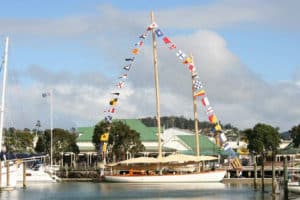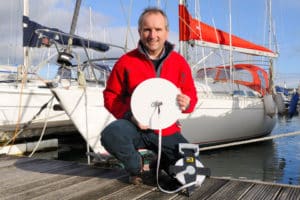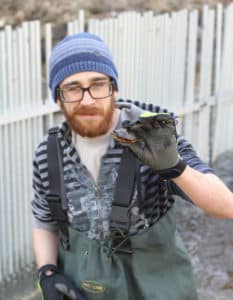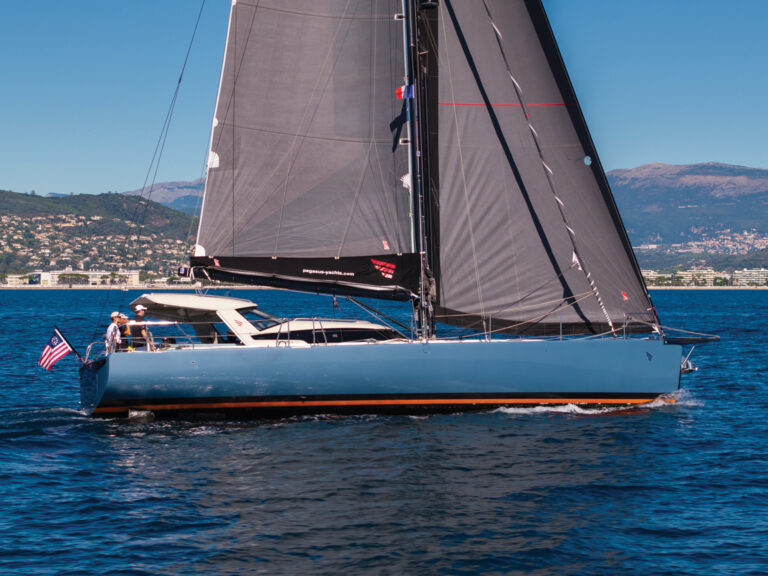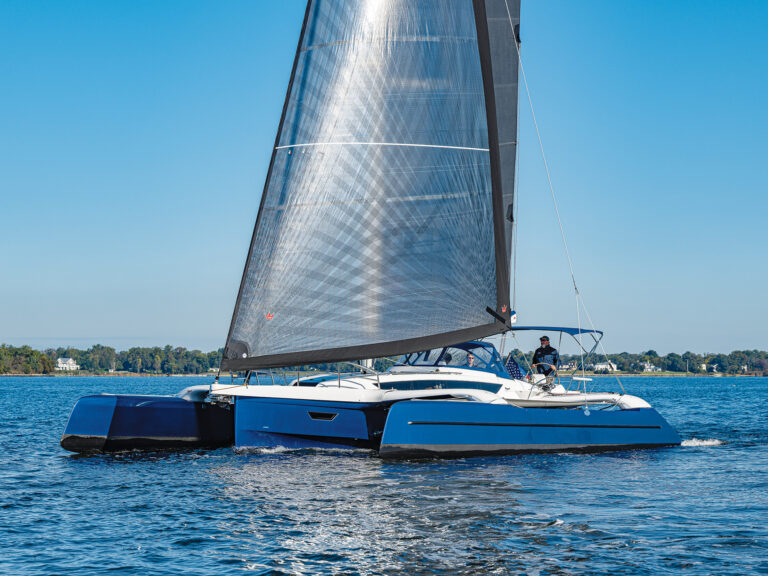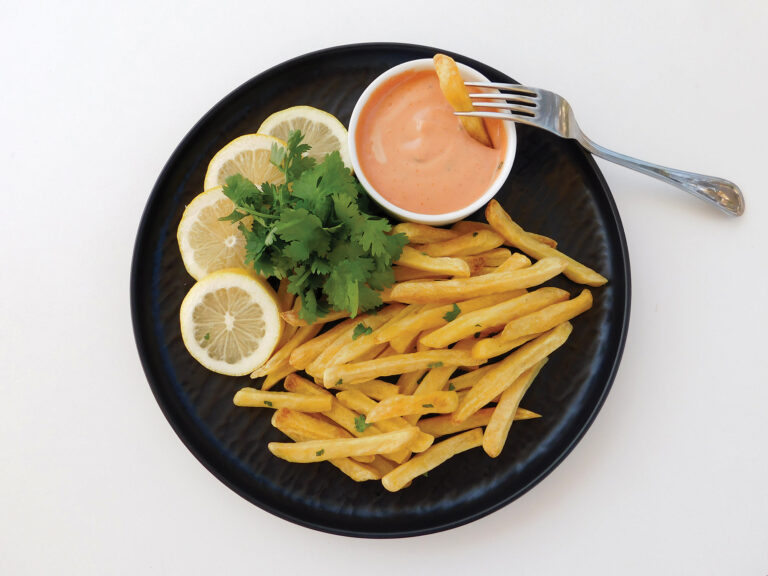|
|
| |
|
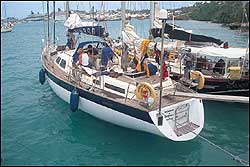
|
| |
| Herb McCormick|
| |
|
|
| |
| The Oyster 49 Nimrod of Orwell, here in Bermuda at voyage’s end, proved to be a fast, capable offshore cruiser.* * *|
| |
|
|
| The tappings what woke me. Persistent. Annoying. Click-click. Pause. Click- click-click-click-click. Pause. I squinted at my watch–oh, joy: 0600–and then at my surroundings. Yes, having flown into Tortola in the British Virgin Islands the afternoon before, I was indeed in full horizontal splendor in a forward berth aboard the Oyster 49 Nimrod of Orwell. Glancing out the port, yup, we were still tied up at the Village Cay Marina. But what in the world was that tapping?
A loose halyard? Iffy. A recycling pump? Possible. Whatever it was, it needed attention, and there were no other volunteers. I stumbled from my bunk and headed for the aft cabin from which the noise was coming. There, sitting before an ancient Olympia Traveller II portable typewriter, the pioneer Caribbean cruising sailor and author Don Street was pecking away for all he was worth. “The D sticks,” he said, as if Id come searching for the problem letter. “Never have been able to get that fixed.”
“Good morning” seemed an improper response, and considering that Street is one of the more prolific sailing and cruising-guide writers ever, even in my haze I did have a question: “Don, you dont have a laptop?”
He spun around, grabbed the tiny typewriter from the desk, and plopped it atop his skinny thighs. Shirtless and smirking, in the cackle for which he earned his nickname–“Squeaky”–he replied with what was clearly a well-rehearsed line. “Oh, yeah,” he said. “Ive got a laptop.”
It seemed a tad early to get played as a straight man, even to a legend, and my bed was still warm. Alas, thered be no return to it. “Just want to finish typing up these ships orders,” Don rasped. “Need to get some coffee going. Lots to do. Wherere the boys?”
Ah, yes, the boys. I’d wandered into Don Street’s world, but I wasn’t alone. Many miles were ahead to be sailed, but others were aboard with whom to sail them. To our veteran captain, Don, one of them was kin, far more than a casual shipmate. And if I was awake, well. . . .
“Fellas,” I called out, moving forward. “Hey, fellas. . . .”
Prepping for Blue Water
“You will PRAY for YOURSELVES!” the preacher bellowed to a thunderous lick from an electric guitar. “And I WILL pray for YOU!” The tent revival had taken place aside a restaurant some hundred yards from our slip at Village Cay. I’d been in Tortola about four hours, a quarter of which had been spent at the nearby bar with our floppy-hatted, much-recognized skipper, knocking back several of his favorite green-bottled beverages. Downing Heinekens with Don Street in a Virgin Islands watering hole was fine entertainment. In passing, some people performed neck-twisting double takes, while others actually stopped to recall brief, long-ago meetings or to profess thanks for his books and articles.
Lounging in the cockpit after dinner, with Don retired below, the nearby prayer meeting had gathered steam. I mustve looked shocked, or stunned, or something, but the three young sailors surrounding me were unfazed. Bored, even. Though all were in their early 20s, Mark Street, Ryan Dickerson, and Kim Carstarphen were all seasoned Caribbean hands. A rocking call to Jesus was not unfamiliar music to their ears. “Dont worry,” said Dons son, Mark, a lovely Irish lilt to his voice. “Youll sleep through it.” And hed been right.
The next morning, as Don typed, the toussle-haired lads emerged from their slumber, zombielike, unwilling extras in a B.V.I. revival of Night of the Living Dead. Their collective lassitude was in inverse proportion to Dons manic morning energy. “OK,” he said, bursting from his quarters and scattering paper across the saloon table, “these are the ships orders. I want everyone to read them before we get going. If anythings unclear, ask me. Now wheres that coffee? And how about some bacon and eggs?”
In a universal gesture long employed by young sons to requests from pesky fathers, Marks eyes rolled back in his head as if an anesthetic had just kicked in. He put the kettle on the stove and shuffled toward the icebox.
%image2%Over two decades ago, at the not-so-tender age of 50, Don became a parent for the fourth time. Now, some 20-odd years later, Mark was a big reason why we were preparing for blue water. A talented, lifelong sailor with an ambition to skipper big, classic yachts, Mark, after several seasons as a paid schooner hand, needed to master celestial navigation to take the next step in his professional career. And so, when Don was offered the job of delivering Nimrod of Orwell across the Atlantic to England, it sounded like an all-around winning proposition. The father, a seasoned navigator, could teach his craft to an eager son, and thered be room to bring along a few friends for an ocean adventure and a payday for the delivery.
Though time constraints would allow me to sail only to Bermuda, the first of three scheduled legs, when Don asked me aboard, I leaped at the opportunity. After all, there’s nothing like sailing with fine sailors, and Nimrod was stacked with them. A laid-back Georgia boy, Ryan was Mark’s best mate–the pair had spent the winter crewing aboard the 125-foot gaff schooner Aello. Kim was a family friend; the nephew of one of Don’s old-time Caribbean sailing pals, he was being sent to sea to literally and figuratively learn the ropes. Learn them he would.
And Don was, well, Don. “This is breakfast six days a week,” he said, as Mark placed a steaming platter of cholesterol-laden protein before him. “Seven if the wife’s not around. And six beers a day.” This time it was Mark’s eyebrows that went skyward. Apparently there was a discrepancy with the figure.
Don’s point was, either despite or because of his dietary regimen, that he was in far better shape than most 50-year-olds, something his doctor told him after a recent physical.
And he did bring to mind the old Mickey Mantle quote that if he’d known he was going to live so long, he’d have taken better care of himself.
But to me, the truly fascinating part of that first morning together before getting under way was the subtle interplay–the gestures, glances, and words unspoken–between father and son. Something was going on between them; I just wasnt sure what. Id have a better idea soon enough.
Escape from New York
In a quiet moment on our first night at sea, when asked about his life, Don began with a nautical reference. Invoking the name of the famous J-class racer, he said, “My keel was laid in 1930, the same year as Shamrock’s.” Remarkably, some seven decades on, he served as co-navigator aboard the regal yacht in the America’s Cup Jubilee. And as his story unfolded, it became clear that “serendipitous” isn’t a poor word to describe Don’s life journey.
The son of a successful New York investment banker, at 12 he began sailing at the Manhasset Bay Yacht Club on Long Island Sound. His mother was a terrific sailor who came from a family of them, and the gift was passed to the next generation. Don didnt know it at the time, but hed found his calling. His college years were interrupted by a volunteer stint in the U.S. Navy during the Korean War. Afterward, he returned to school and earned a degree in American History at Catholic University. Then he went back to sea, for two years skippering raceboats in Europe and making his first transatlantic passage.
Despite a growing interest in naval architecture, after returning home, he declined a job offer from the prestigious yacht-design firm Sparkman & Stephens. It wouldve taken him into his despised “canyons of New York,” those same dismal corridors that dispatched his father into retirement at 55 with a pair of heart attacks and three ulcers to show for all his efforts.
Even so, Don almost succumbed to a similar path, going so far as to shave off his red beard after accepting a position with a downtown marine-insurance concern. Ultimately, he couldnt bring himself to do it. With a $45 ticket on a Pan-Am DC-6 “vomit comet” to San Juan, Puerto Rico, he headed for the Caribbean to seek his destiny. In New York, theyd said that a man couldnt make a living on the water or in the islands–the idea was to get wealthy, then go sailing–but Don was out to prove them wrong.
In 1957, in the first of two life-changing events, Don purchased a 45-foot engineless cutter called Iolaire, built in 1905. Considering that the boat would, in many ways, define him for nearly half a century, it was a good deal: $3,000 down, and a grand a year for four more years.
Don used Iolaire to join the burgeoning Virgin Islands charter trade, which led to the second momentous incident. During a visit to Caneel Bay, he met the vacationing author John Steinbeck who, over cocktails, urged Don to try his hand at writing. Don took him to heart and eventually published The Cruising Guide to the Lesser Antilles, the first of seven books and hundreds of magazine articles. Later, to augment his earnings as a writer, he did deliveries, sold insurance, and started producing the Imray-Iolaire charts–anything for a buck.
“The reason Iolaire is red,” Don said, “is because it matches the color of my bank account.” Still, hed proven the New York naysayers wrong. On his own terms, he was making a living as a sailor. Don had married his first wife, Marilyn, by then, and it wasnt always easy when the kids started coming. Their daughter, Dory, grew up to become an Americas Cup sailor. But Marilyn died young in tragic circumstances.
He wed a second time after meeting Trich, an Irish lass, during a Caribbean layover on her job as a flight attendant for Aer Lingus. A pair of sons, Donald and Richard, arrived in fairly rapid succession. But it was another 18 years before the Streets were blessed with a bit of a surprise named Mark. Though Don didnt say it, of his future at least one thing was certain. No one in his family would ever go ballistic if eventually he opted for a life at sea.
North to Bermuda
Early the next evening, Mark popped on deck to take over the helm from his bearded dad, resplendent in a bright-red sailing smock. Mark, who bears a resemblance to the rock-star Sting in his younger days, couldn’t contain himself. “Oh, man,” he laughed. “You look like Santa Claus on a summer holiday.”
Wed been northbound from Tortola for two days, and several things were becoming apparent. With its ketch rig and Dons penchant for pouring on canvas–wed all become adept at hoisting and trimming his favorite sail, the mizzen spinnaker–Nimrod of Orwell was a quick, capable offshore passagemaker that reveled in the fresh trade-wind easterlies. But the boat was also systems rich and maddeningly complicated, the overengineered product of a tinkering owner who was an ocean away. It all probably made sense to him, but it didnt to us.
What did make sense, especially to Don, was establishing a clear sense of onboard order. As a seagoing creature of habit, a slave to underway routine, the successful execution of efficient, repetitive, well-reasoned tasks were to him the essence of good seamanship. And if the lads took nothing else from this voyage, this supreme lesson they would certainly learn.
It started with “Nimrods Standing Orders,” the ships papers hed laid out for mandatory consumption the morning of our departure. The typed, single-spaced list–numbered 1 through 30–covered everything from man-overboard contingencies and watchkeeping to manners and etiquette. A fitting subtitle might have been “Dons Unassailable Laws of the Sea.”
As we ticked off steady miles toward Bermuda, Don underscored his written thesis with a steady commentary of advice, stories, and opinions. Of all three he had plenty, all gleaned from personal experience. Among them:
On the four diapers you need to cruise with kids: “The dirty ones over the side; the fish handle the initial cleaning. The seconds rinsing in fresh water. Thirds on the lifelines. And the fourth is applied to the bottom of the little one.”
On retrieving a bucketful of seawater: “Always dip it from the windward side. If you slip youll tumble into the cockpit, not overboard.”
On helming: “Steer small, no big rudder adjustments. But stay ahead of the compass.”
On the relative merits of thirst-quenching beverages: “Ill take beer. Ever see what water does to metal? Rust! Whatll it do to a stomach?”
On lifelines: “Give me lashings over turnbuckles. If someone goes over the side you can slash the lashings with a knife to retrieve them.”
On luffing headsails and maintaining a course when sailing to weather: “The minute the jib starts talking to you, youre too high.”
And, finally, on the wire halyards rattling in the mizzenmast: “Sounds like a pair of skeletons copulating.”
Of course, Dons most pointed observations were aimed at Mark. At one stage at dusk, while holding course on a deep run and swapping stories with Ryan, for a brief, uncharacteristic instant Mark let the wheel drift, luffing the spinnaker and the genoa. The sails, and Don, responded noisily. “Stop philosophizing and pay attention!” cried Don. “Thats why helmsmen shouldnt talk during a race–it ruins their concentration.”
Mark muttered something under his breath. Having witnessed similar exchanges at least a dozen times, Ryan cracked up. “Im totally enjoying this,” he said, looking up one Street and down the other. “You two guys are great. What a vacation.”
Ryan was on to something. Like fathers and sons everywhere, one of them was pretty sure he knew everything. The other one probably did.
The Son Also Rises
As we climbed up the latitudes, the weather became unsettled, and just after lunch on our fourth day at sea, I was at the helm when the squall hit. The wind swung a good 50 degrees, and I bore off with it, altering course from 360 to 050. It was blowing a steady 30 knots with fast, hard bullets to 40, and sheets of horizontal rain beat the angled waves into smooth, blue moguls of submission. What happened next was equally impressive.
In an instant, Mark was on deck and bounding forward, harness on and tether clipped in. Quick as a point guard, he struck the preventer and took to the mainsheet. The breeze backed a bit, and Mark trimmed perfectly as I came on the wind to 010. “How’s the helm?
How’s the helm?” he called over the cacophony. The helm was just about perfect, thanks.
Several moments passed and the staysail was sheeted home and drawing, the mizzen doused and tightly furled. Mark descended below. He wasnt even breathing hard. “Nice when that happens in the daylight,” he concluded.
Uh, yeah.
All of us have formative memories from our youth, and Marks came at the ripe old age of 3 in Antiguas Falmouth Harbour, seated on the knee of a friend of his fathers named Captain John Bardon. Captain Bardons charge at the time was a magnificent square-rigger, and Mark remembers the polished brass, the gleaming spars, and the respect the captain commanded from all the sailors in their crisp, full whites.
“From that moment on, whenever anyone asked me what I wanted to do when I grew up, my answer was always the same,” Mark said during one wee morning’s watch. “I want to be a skipper.”
The path wouldn’t necessarily be easy. He was a prodigy of sorts, just a speck of a thing when he started racing Dragons off the coast of Ireland with his dad, who later built him a little pram–Mark’s Ark–to refine his skills while living aboard Iolaire in the islands. But Don was a tough taskmaster. “If I went head to wind he’d go batty,” Mark said. “I’d come in crying all the time. For a while I didn’t want to go near the thing.”
By 8, however, hed started racing his own boats, without adults, and the thrill of beating kids a good five or six years older was very satisfying. “Winning silver, that was the business,” he said. “Thats what really got me enjoying sailing again, the racing. Its still my favorite thing to do on a boat.”
Like his father, Mark sought his destiny in the Caribbean. One day, working his way up the ranks as a deckhand aboard a classic schooner, he glanced up and damn near swallowed a bolt dropped from far aloft. Perhaps fittingly, like the yin-yang tattoo on his shoulder (an adornment his father finds less than appealing), even his chipped-tooth smile bears a souvenir of the life hes chosen.
Hours after the squall had passed, with the boys off watch and all quiet down below, I described to Don the efficient, athletic grace that Mark had displayed in bringing sudden order to the potential chaos. Dons not the sort of person who dispenses praise liberally, but for the first time on the trip, I caught a gleam in his eye as he spoke about his son.
“Hes got a lot more confidence than I ever had at that age,” he said. “Always has, really. When he was 10, I nicknamed him Mr. O.C. Mister Overconfident. But he does have tremendous confidence to go with his tremendous charm. Hes going to go somewhere in this business.”
I wouldnt disagree with him. But first we had to get to Bermuda.
A Torch Passed
The last argument between the two-way Streets was a draw. Even at the time, the details were hazy–something about who did or didn’t turn the propane on or off. But the final exchange was memorable. “Every time I’ve had to talk to you, I’ve been absolutely right,” said Don.
“Every time Ive come back at you, Ive been absolutely right,” countered Mark. It was a Mexican standoff in the blue North Atlantic.
In all honesty, the end of the voyage was bizarre. We missed Bermuda on our first try (see the Editors Log, elsewhere on this website), an unfortunate circumstance that added the better part of a long day to the trip. The lads had been despairing about the lack of female companionship (among other shoreside fantasies) and were ready for terra firma, but to their credit, they were magnanimous enough to let it pass (almost) without comment.
Then Don took a fairly nasty fall in the saloon and reiterated that this transatlantic crossing, his 11th, would almost certainly be his last. With Mark in the midst of his first, I realized that I was witnessing, first-hand, the passing of a family torch. Among my many mixed emotions, I mostly felt privileged.
We finally made it to the island, and the next day, I gathered my things for the flight home. Before leaving, I asked Mark what it was like sailing with his father.
“Well, the old man can suck some of the fun out of it–he doesn’t really know when to take a break and chill,” he said. But then I glimpsed a sparkle not unlike the one Don had exhibited when talking about his boy’s future prospects. “But you’ve got to hand it to him; he’s a great teacher and always good to come back to. You can bitch about it, but I don’t know how many times on this trip I’ve thought, damn, I didn’t know that. If I survive this, I’ll be sorted.”
Father and son. Young and old. Night and day. Yet they were both wonderful sailors, who lived to be at sea, with a shared love of traditional boats, sweet sheer lines, and night watches. Stubborn coots, yes, but cut from the same cloth.
Still, even with hundreds of miles behind us, I hopped in the taxi with an unanswered question. How in creation could two guys so different be so much alike?
A year after the voyage described above and the subsequent completion of Nimrods transatlantic crossing, Mark Street had spent the Americas Cup in New Zealand working as a mate aboard the classic 95-foot Fife-designed cutter Moonbeam V. Afterward, fulfilling his young lifes ambition, he returned to Europe and took command of the 53-foot, 1898 Camper and Nicholson cutter Avel. Meanwhile, Papa Don was–where else?–back in the Caribbean, chasing the breeze.

